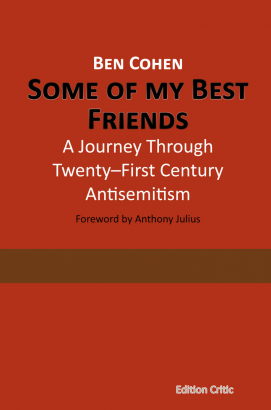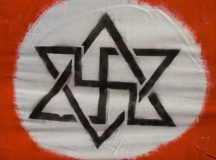First, the disclosure: Ben Cohen is a friend and comrade who was kind enough to invite me to his son’s bar mitzvah in Jerusalem this summer. Surrounded by friends and family, the proud father began his speech to celebrate his son’s moment of Jewish maturity by promising that on that special day, ‘I will not mention antisemitism.’ This was not only because so much of his professional life is spent talking, thinking and writing about antisemitism. It was because, for those who maintain an interest in the subject, 2014 has joined 2002, 2006 and 2009 as a year when Diaspora Jewish communities, particularly in Western Europe, were shaken and bruised by a wave of antisemitic hate crimes fuelled by reactions to Israeli military operations in, chronologically, the West Bank, Lebanon and Gaza (twice). Each of these episodes has been significant enough, or the concerns of European Jews vociferous enough, for political leaders in several countries to condemn antisemitism as a hatred that no longer belongs in modern Europe. But it keeps returning nonetheless, each episode accompanied by its own distinctive contribution to the language and themes of contemporary antisemitism: none of them new, but each temporarily dominating anti-Zionist discourse.
In 2002, the figure of then-Israeli Prime Minister Ariel Sharon was imbued with demonic characteristics by Israel’s enemies; while the approaching war with Iraq was characterised as the work of global Zionism, with ‘neo-con’ added to the roll call of euphemisms for the hidden Jewish hand controlling governments and conspiring for war. In 2006, Israel’s opponents ascribed to it inhuman cruelty expressed via the murder of innocents. In 2009, the dominant theme of anti-Zionist hysteria was to portray Israel as the inheritors and emulators of Nazi Germany, with Gaza as the Warsaw Ghetto. And this year, the twitter hashtag #HitlerWasRight became the calling card of antisemitism on social media, as people all over the globe proclaimed that Hitler had the right idea, that the Holocaust was deserved, that those Jews who survived the Nazi apocalypse only did so to remind future generations of their evil.
The publication of this book, a collection of articles and essays written by Cohen between 2004 and 2013, is therefore timely, and the range of subjects it covers is remarkable. Discussion of historical Marxist attitudes to Jewish nationhood sits along surveys of Muslim-Jewish relations and British football fan culture. The diplomacy of the Israel-Palestine conflict and wider Middle East politics are the subject of several articles, as is the academic study of antisemitism. The Boycott, Divestment and Sanctions (BDS) movement takes its place alongside the Iranian nuclear programme, resurgent fascism in Europe and threats to Jewish religious rituals such as shechita and brit milah. One of the most powerful articles in this collection concerns the Church of Scotland’s theological assault on Judaism in the guise of a critique of Israeli policies (153-5), a reminder that modern Europe has not succeeded in eradicating ancient enmities from its culture. Mohammed Morsi, Hugo Chavez and Viktor Orban are each the subject of articles. If Cohen’s book is, as the title states, A Journey through Twenty-First Century Antisemitism, it is more gap year world tour than exclusive city-break.
In truth, the range of subjects covered in this book is an accurate reflection of the confusing, and at times chaotic, debate that surrounds antisemitism. It is apt that the section of the book on ‘Antisemitism and Anti-Judaism’ begins with an article titled ‘What antisemitism is (and isn’t)’. The academic and political arguments over precisely this question have at times left damaging scars, such as during the misguided and largely unnecessary battles over the European Union Monitoring Centre on Racism and Xenophobia (EUMC) Working Definition of Antisemitism, or the short life and sudden demise of the Yale Interdisciplinary Initiative for the Study of Antisemitism (YIISA). The central article of this section and of the entire book (‘The Big Lie Returns’) contains Cohen’s original formulation of ‘bierkeller and bistro antisemitism.’ Bierkeller antisemitism, he explains, ‘employs such means as violence, verbal abuse, commercial harassment, and advocacy of anti-Jewish legal measures.’ Its name associates it with the antisemitic thuggery of 1920s and 1930s Nazism, and therefore with an ‘old’ antisemitism that, in theory at least, has been discredited by history. Bistro antisemitism, on the other hand, ‘sits in a higher and outwardly more civilised realm, providing what left-wing activists would call a “safe space” to critically assess the global impact of Jewish cabals from Washington D.C., to Jerusalem.’ The themes of this intellectual, left-wing antisemitism ‘include the depiction of Palestinians as the victims of a second Holocaust, the breaking of the silence supposedly imposed upon honest discussions of Jewish political and economic power, and the contention … that American Jewish government officials are more suspect than others because of a potential second loyalty to Israel.’
The difference between bierkeller and bistro antisemitism is illustrated by the striking juxtaposition, early in the book, of tributes to Vidal Sassoon and Ronnie Fraser (29-35). Sassoon, best known as a celebrity hairdresser, spent his youth fighting fascist gangs in the East End of London in the immediate post-war years. He and his friends in the 43 Group would set out ‘armed with knives, coshes and knuckledusters’, and often return home with bruises. This was antisemitism red in tooth and claw, and Jewish self-defence was both direct and brutal. Immediately following Cohen’s obituary for Sassoon are two articles about Ronnie Fraser, a Jewish further education lecturer who unsuccessfully sued the University and College Union (UCU) in 2012, on the grounds that UCU’s activities in support of the boycott of Israeli academics constituted discrimination against its Jewish members. The contrast between these two episodes is stark, and not only because the 43 Group achieved its goals while Fraser lost his case. Rather, it is the idea that both belong in a book about antisemitism, and that Sassoon and Fraser are both heroes in the defence of Jews against the prejudice they face, that draws attention.
Since Cohen’s ‘The Big Lie Returns’ was first published in Commentary magazine in January 2012, jihadists have murdered French Jews in Toulouse and Belgian Jews in Brussels; rioting mobs, made up primarily of French Muslims, have burned synagogues and Jewish shops in Paris and Sarcelles. Even in Britain, where the antisemitism is less violent than elsewhere, the summer of 2014 saw a record rise in antisemitic incidents fuelled largely by antisemitism from sections of British Muslim communities, while supermarkets were invaded by mobs determined to prevent them from selling Israeli-sourced goods. Meanwhile, Jewish religious rituals are under threat as much from human rights advocates of the left as they are from the xenophobic right. It is true that European fascism has made a recent return via Jobbik in Hungary and Golden Dawn in Greece, but insofar as Jews in Western Europe currently face ‘violence, verbal abuse, commercial harassment, and advocacy of anti-Jewish legal measures,’ these assaults on Jewish life do not come from the bierkeller. In these countries, Cohen’s dichotomy of bierkeller and bistro antisemitism requires a third category: banlieue antisemitism, perhaps, named after the deprived suburbs of French cities from which much Muslim and jihadist antisemitism now emanates.
This banlieue antisemitism, and the role played by some European Muslims in 21st century antisemitism, are at the core of the argument that this is a new form of antisemitism, qualitatively different from the anti-Jewish prejudice which ultimately destroyed much of European Jewry in the previous century. The most acute threat to Jewish life in Europe today comes from the jihadists of al-Qaeda, ISIS and their supporters. Much antisemitic hate crime in Western Europe is perpetrated by Muslim youths (although this varies from country to country, and from city to city). Yet while the Muslim component in contemporary West European antisemitism is significant and undeniable, it often manifests through a curious combination of identity politics, religious affiliation and a secularised, deracinated language. This is not solely a problem of bigoted and aggressive interpretations of Islam. The enthusiasm with which thousands of young European Muslims have joined ISIS is more a reflection of political utopianism than of religious conservatism or socio-economic deprivation. Those British Muslims who verbally abuse British Jews on the street are more likely to shout ‘Heil Hitler’ than ‘Allahu Akhbar’ when they do so. This is despite the fact that their parents and grandparents were probably chased through the very same streets by gangs of neo-Nazi skinheads shouting similar slogans. Their antisemitism is not just an offence to Jews; it is often part of a package of extreme, anti-social attitudes and behaviour that, amongst other things, is a betrayal of the struggle of their own communities to settle and prosper in Britain. This generational amnesia and political illiteracy reminds us of the fundamental irrationality within hate crime. To explain such behaviour as an exaggerated or misplaced expression of legitimate anger about Israel would be a gross failure to understand the phenomenon.
Inevitably, all discussions about antisemitism in the 21st century are framed by the opposing poles of Israel and the Holocaust: the ultimate representations of Jewish power and powerlessness. Antisemites understand all too well the importance of how the Holocaust is understood and interpreted. The first attempt to generate an antisemitic discourse that took account of the Holocaust simply denied that the Holocaust happened at all. Next, those who were not committed to the revival of neo-Nazism but were keen to weaken or eliminate Israel, acknowledged the Holocaust as the worst crime in history but relativised it by arguing that Israel has replicated its methods. In this narrative, Gaza is the Warsaw Ghetto and Israel’s repression of Palestinian nationhood belongs in the roll call of humanity’s most shameful deeds. Most recent is the rise of the phenomenon of ‘Holocaust taunting’, delivered via the Twitter hashtag #HitlerIsRight. The social media equivalent of a swastika daubed on a synagogue, this form of abuse is delivered across continents directly to the mobile phone in your pocket. While Holocaust denial and relativisation reflect a sense of weakness in the face of the political power and meaning of the Holocaust, this latest iteration is bold and utterly contemptuous of both Jewish and European sensitivities. Nothing symbolises the crumbling of European Jewish defences against antisemitism more than the impunity with which today’s antisemites can tweet ‘#HitlerWasRight’ and suffer no legal or social consequences. Many of the lessons of the Holocaust have been learnt well in European societies, while others have been neglected or even inverted. The universalising character of Holocaust education is a powerful tool for the teaching of tolerance and equality but must not obscure the specifically Jewish story at its heart.
Meanwhile, European Jews try to find ways to build new relationships with the societies in which they live that are informed by the memory and meaning of the Holocaust, but not overshadowed by it. Israel plays a profound and subtle role in this process. Critics of the centrality of Israel in Diaspora Jewish life argue that this relationship endangers Diaspora Jewry, citing this summer’s antisemitism in Europe as the latest evidence. Diaspora Jews should distance themselves more from Israel and be more critical of its policies – so the argument goes – and they will suffer less hate crime, less public opprobrium, less political antipathy. This argument is logical but flawed. Firstly, because antisemitism is rarely a rational system of thought; and secondly, because the extent to which Diaspora Jewish identity has absorbed Israel into its core reflects the dependency of many Jews on Israel’s existence as a font of their own Jewish self-confidence. Zionism did not just create a state: it wrought a revolution in Jewish political life, from the vulnerability of collective Jewish powerlessness to the ethical dilemmas that come with Jewish power and sovereignty. At the heart of this is the question of choice. Israel is the most powerful nation in its region by any measure, and the gap between it and its neighbours is growing larger. This alone fulfils one of the central goals of Zionism: to provide Jews with the power to make their own choices about their future. Furthermore, Israel now holds the world’s largest Jewish population and its demographic trends are more optimistic than most Diaspora communities. To paraphrase the title of this book, the 20th century was full of Jews making journeys due to antisemitism, few of them with any real choice. Jews fleeing pogroms in Russia at the beginning of the century; German Jews in the 1930s; post-war illegal refugee ships to Palestine; secret flights from Yemen, Iraq and other Arab countries to Israel; and of course, the trains that crossed Europe to deliver European Jewry to its destruction. The existence and future security of Israel make Jewish journeys through 21st century antisemitism an entirely different prospect.






































Thank you, Dave Rich, for this fascinating review, so fascinating that I have just uploaded the book to my e-reader.
May I add to your comment in the last paragraph (“Diaspora Jews should distance themselves more from Israel and be more critical of its policies – so the argument goes – and they will suffer less hate crime, less public opprobrium, less political antipathy. This argument is logical but flawed.”) the observation that sociologists have long known and commented on the phenomenon known as “blaming the victims”. This is exactly as stated in the quote “if only – name the favoured victim and despised out group – would behave differently, then all would be well with them.” Equally, the behaviour of the group has absolutely nothing to do with the treatment they will receive from their persecutors. Only changes in the law will achieve that.
This is why the EUMC Working Definition on Antisemitism was so important: it made it abundantly clear that prejudice and discrimination had nothing to do with the victim and everything to do with the perpetrator and equally that the judge of whether discrimination had occurred was, initially, for the alleged victim to determine, not the alleged perpetrator.
It is for this reason that the decision of the UCU Executive and the Executive of the Green Party (among others) to drop the EUMC definition in favour of their own executives deciding whether discrimination had occurred is, to say the least, flawed.
Can one imagine these groups (and others) deciding to replace the UK law on discrimination as it relates to, say, Afro-Caribbean members of their organisations with their own executives judgement on these matters? And if not, why is it acceptable for it be so with respect to Jews?